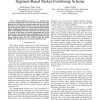Free Online Productivity Tools
i2Speak
i2Symbol
i2OCR
iTex2Img
iWeb2Print
iWeb2Shot
i2Type
iPdf2Split
iPdf2Merge
i2Bopomofo
i2Arabic
i2Style
i2Image
i2PDF
iLatex2Rtf
Sci2ools
110
Voted
WD
2010
2010
Measured performance of a memory-efficient segment-based packet-combining scheme
Abstract--Packet-combining schemes are an attractive improvement to ARQ schemes, since they allow receivers to keep the good parts of an otherwise erroneous packet and use these with good parts from subsequent packets to allow for quicker decoding. In the previous paper [1] a memory-efficient hard-decision packet combining scheme has been described and analysed, which relies on intermediate checksums spread into the user data part of a packet. In this paper we provide experimental data on the performance of the proposed packet-combining scheme, showing that a significant percentage of the wireless links found in a large indoor wireless testbed (the TKN TWIST testbed [2]) indeed benefits from introducing such a packet-combining scheme.
Erroneous Packet | Memory-efficient Hard-decision Packet | Packet-combining Scheme | WD 2010 | Wireless Networks |
Related Content
| Added | 15 Feb 2011 |
| Updated | 15 Feb 2011 |
| Type | Journal |
| Year | 2010 |
| Where | WD |
| Authors | Danil Kipnis, Tobias Jacob, Andreas Willig |
Comments (0)

